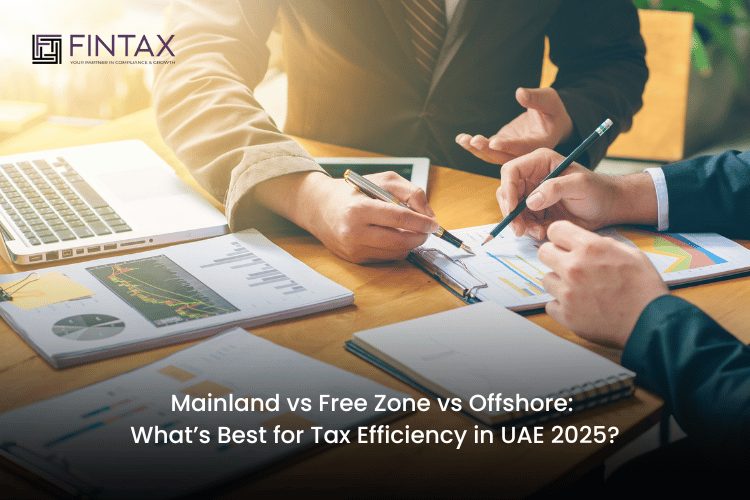Mainland vs Free Zone vs Offshore: What’s Best for Tax Efficiency in UAE 2025?
German FinTax
October 4, 2025

Choosing a business setup in the UAE isn’t just about getting a license anymore. With the introduction of the UAE Corporate Tax Law and new clarifications for Free Zone tax benefits in 2025, your business structure now plays a major role in how much tax you pay.
At German Fintax Consultancy, we help UAE businesses evaluate the tax implications of different structures, enabling them to operate efficiently, stay compliant, and maximise tax savings.
UAE Corporate Tax in 2025: What Businesses Must Know
Since the launch of the UAE Corporate Tax regime (0% up to AED 375,000 profit; 9% thereafter), tax planning has become essential. Free Zones can still offer 0% corporate tax on qualifying income, but only if businesses meet the Qualifying Free Zone Person (QFZP) criteria which require maintaining a real business presence in the Free Zone, including physical office space, employees, and economic substance. Mainland companies are subject to standard corporate tax, while Offshore entities are mainly used for holding or international purposes.
Additionally, large multinational groups with annual revenues of €750m or more face the Domestic Minimum Top-up Tax (DMTT) at 15%, in line with global OECD Pillar Two rules.
What this really means is UAE businesses must now think strategically before choosing a setup.
Mainland Companies in UAE
What this means: A Mainland company is licensed by the Department of Economic Development (DED) and can trade anywhere in the UAE, including with government clients.
Tax Treatment (2025):
- Subject to UAE corporate tax (0% up to AED 375,000; 9% thereafter).
- No exemptions like Free Zones.
- Full access to the UAE market.
Best for:
- Businesses targeting local UAE customers.
- Companies wanting to participate in government contracts and tenders.
Free Zone Companies in UAE
What this means: Free Zones offer 100% foreign ownership, simplified incorporation, and historically tax-free incentives.
Tax Treatment (2025):
- Can qualify for 0% tax on qualifying income if QFZP rules are met (requires physical presence, employees, and economic substance).
- Non-qualifying income is taxed at standard rates.
- Substance requirements (real office, employees, management) must be maintained.
Best for:
- Businesses engaged in exports, international services, logistics, or IP holding.
- Investors looking for tax efficiency with compliance discipline.
Offshore Companies in UAE
What this means: Offshore companies (e.g., JAFZA Offshore, RAK ICC) are primarily used for holding, asset protection, or international trading. They cannot trade directly within the UAE mainland.
Tax Treatment (2025):
- Typically, outside UAE’s corporate tax scope if no UAE-sourced income.
- Increasing scrutiny under substance rules, beneficial ownership, and global transparency standards.
Best for:
- Holding companies, IP ownership, or cross-border structures.
- Investors seeking asset protection and international tax planning, not direct UAE market access.
Mainland vs Free Zone vs Offshore: Tax Comparison
Feature | Mainland | Free Zone | Offshore |
Corporate Tax Rate (2025) | 0% up to AED 375k; 9% thereafter | 0% on qualifying income, 9% otherwise | Exempt if no UAE-sourced income |
Access to UAE Market | Full access | Limited (requires mainland distributor/branch) | No direct access |
Ownership Rules | 100% foreign ownership allowed (recent reforms) | 100% foreign ownership allowed | 100% foreign ownership allowed |
Compliance | Standard CT + TP | QFZP compliance + substance requirements | Substance & transparency rules |
Best For | Local trading, services, and government contracts | Export-driven, IP, logistics, international services | Holding, asset/IP management, global structures |
Which Setup is Best for Tax Efficiency in 2025?
- Choose Mainland if your business is primarily customer-facing within the UAE or requires government contracts.
- Choose Free Zone if your business focuses on exports, international services, or IP-based income and you can meet substance and compliance rules.
- Choose Offshore if your goal is international structuring, holding assets, or tax residency planning outside the UAE.
Remember: Tax efficiency now depends on both compliance and substance — not just selecting the lowest rate.
How German Fintax Consultancy Can Help
At German Fintax Consultancy (Dubai), we specialise in UAE tax advisory and structuring for businesses navigating the new rules. Our services include:
- Corporate tax impact analysis for Mainland vs Free Zone vs Offshore.
- Guidance on Qualifying Free Zone Person (QFZP) compliance.
- Transfer pricing documentation and tax filing support.
- Structuring advice for holding and cross-border investments.
If you’re unsure which structure works best for your business in 2025, German Fintax Consultancy can provide a tailored tax efficiency roadmap. Contact us today to get started.
Whether you’re setting up a new entity or restructuring in 2025, our experts ensure your business is both compliant and tax-efficient.
Recent Post
Categories
Any Question?
About German FinTax
German FinTax Consultancy offers expert solutions in taxation, accounting, and compliance to individuals and businesses across the UAE.
- Dubai, United Arab Emirates
- info@germanfintaxconsultancy.com
- +971 50 667 0856
Quick Links
Copyright © 2025 German FinTax Consultancy. All rights reserved
